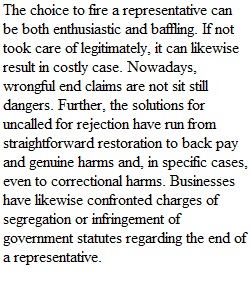


Q Only Funny until Someone Quits: The Firing Contest The owner of a chain of QC Mart convenience stores in Bettendorf, Iowa, offered a $10 cash prize to workers who could predict which of them would be the next to be fired. A memo distributed to all employees asked them to write down and seal in an envelope the name of the coworker they thought would be fired next. The owner explained that secret shoppers would visit the store to see which cashiers were committing such offenses as wearing a hat, talking on a cell phone, and not wearing a QC Mart shirt. Once a firing occurred, the contest would begin again. After receiving the memo, QC Mart cashier Misty Shelsky, along with her store manager and a few other employees, quit. When Shelsky applied for unemployment benefits, the owner challenged the claim, asserting that she had left the job voluntarily. As defined by the Department of Labor, a constructive discharge (treated as a termination) occurs when a worker’s resignation may be found not to be voluntary because the employer has created a hostile or intolerable work environment or has applied other forms of pressure or coercion that forced the employee to quit or resign. Should Shelsky be viewed as a terminated employee? Decide. Explain. Sources: Clark Kauffman, “Firing Contest by Boss Leads Employees to Quit,” The Des Moines Register, October 2, 2011, p. 1B; and U.S. Department of Labor, “WARN Advisor Glossary: Constructive Discharge.
View Related Questions